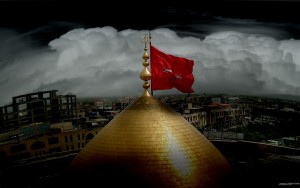The spirit and revolution of Karbala require from us a pure heart, sincere soul and truth-seeking mind to understand its universal message and globa

The spirit and revolution of Karbala require from us a pure heart, sincere soul and truth-seeking mind to understand its universal message and global impact. If we take a deep insight into this great revolution, we will see it unique and distinct from all historical revolts of the world. Throughout the history, there has never been a leader who predicted about his own death before even setting a foot in the march. But Imam Husain, quite willingly, goes on treading the path to his sacrifice and takes every necessary step towards achieving it. He says addressing to the people at Mecca:
“O people, even if my body be cut into pieces by spears and wolves between Al-Nawawees and Karbala, there is no question of the day, which was already written. Pleasing God is our aim, we the family of the Prophet (pbuh)”.
In a sermon while proceeding towards Karbala, Husain says to his followers:
“O’ people, The Prophet of Islam has said that if a person sees a tyrannical ruler transgressing against Allah and oppressing people, but does nothing by word or action to change the situation, then it will be just for God to place him where he belongs. Do you not see what low level the affairs have come to? Do you not observe that the truth has not been adhered to and falsehood has no limits? And, as for me, I look upon death but as a means of attaining martyrdom. I consider life among transgressors an agony and affliction.”
The assassination of Imam Husain came as a shock and serious setback to the whole Muslim Ummah. The way he was assassinated and the harsh treatment meted out to his noble family evoked rage and disorder among all Muslims who held the Prophet’s family in the highest esteem. As a result, Muslims the world over disassociated themselves with the tyrannical ruler of Yzeed and his Un-Islamic practices and policies. Everyone who loved the Prophet came out to curse upon the murderers of his family. Hence, the revolution of Imam had fulfilled the most urgent and pressing need of the time by unveiling Yazeed’s un-Islamic character to the general public and left no doubt in any Muslim’s heart about the Umayyad’s autocracy and atrocity. Thus, the revolution of Imam uprooted the Un-Islamic political concepts that Ummayyad regime was trying to indoctrinate into Muslim minds.
Today, Imam Husain’s revolution serves as a lively example of how we should combat the evils of autocracy, dictatorship, oppression, terrorism and injustice in their countries. It provides a stimulant to enliven their spirit and create an inner spark to attain peace, freedom, justice and democracy. Husain has been an epitome of tolerance not only for the Muslims but also for every human being with whom injustice is being perpetrated, no matter to which religion he belongs and in which form is the injustice.
Nearly each and every remarkable revolution of the world got inspiration from the martyrdom of Imam Hussain. Although his sacrifice occurred on Karbala some 1400 years ago, it still remains universal symbol of struggle for peace and justice and elimination of violence and terrorism. It also tells us those Muslim terrorists who make false claims of being Mujahidin (fighters in the path of Allah) and commit the barbaric acts of violence calling themselves Muslims, are just terrorists as these acts go completely against the true essence of Imam Hussain’s Jihad.
One of the most inspiring words ever said is that of Imam Husain which he spoke while addressing the enemies in Karbala: “If you do not have religion, at least be a free man in your life of this world,” because a free man can differentiate between the good and evil more easily than a biased one.
Our father of nation, Gandhiji was highly inspired by Imam Husain. He used to say: “I learned from Husain how to achieve victory while being oppressed.”
According to our great Indian poet Rabindranath Tagore, Husain’s sacrifice indicates spiritual liberation. He writes: “In order to keep alive justice and truth, instead of an army or weapons, success can be achieved by sacrificing lives, exactly what Imam Hussain did. Such an everlasting victory can only be achieved by the one who totally believes and trust in the Almighty God.”
Edward G. Brown, the professor of Arabic and oriental studies at the University of Cambridge, praises Imam Husain in these words:
“… a reminder of the blood-stained field of Kerbela, where the grandson of the Apostle of God fell at length, tortured by thirst and surrounded by the bodies of his murdered kinsmen, has been at anytime since then sufficient to evoke, even in the most lukewarm and heedless, the deepest emotions, the most frantic grief, and an exaltation of spirit before which pain, danger and death shrink to unconsidered trifles.”
[A Literary History of Persia, London, 1919, p. 227]
Written By Ghulam Rasool Dehlvi


COMMENTS